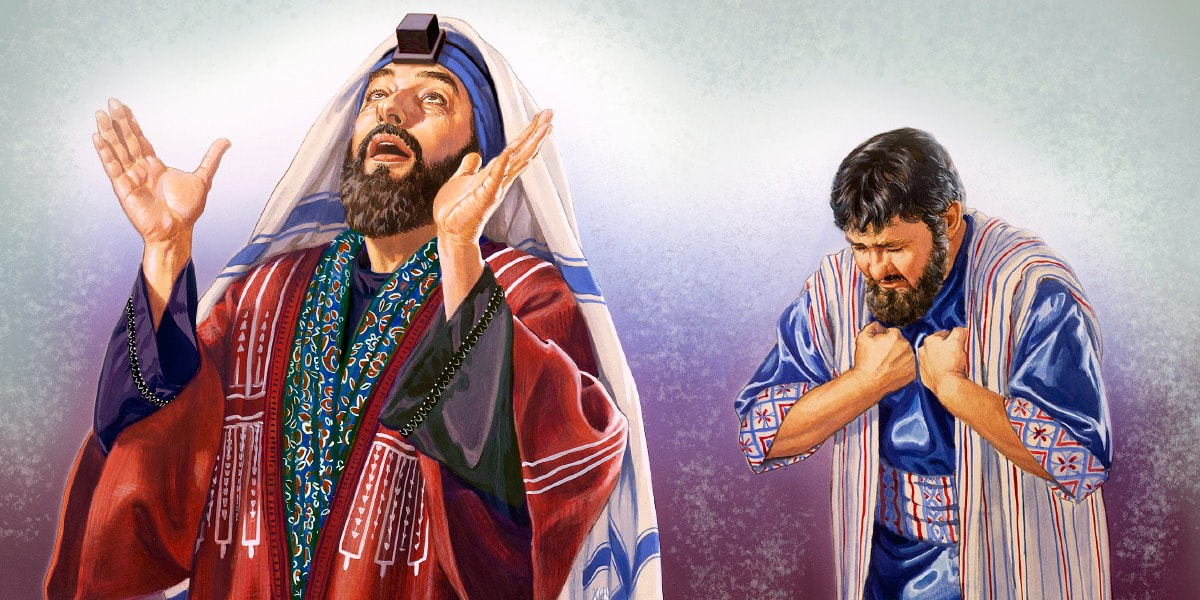|
In the story of Jekyll and Hyde, Jekyll takes a potion and becomes the completely selfish and wicked Hyde, who takes control of Jekyll. In us, we also have both good and bad sides that are constantly at war. Let’s learn from Romans 7:1-25.
In the passage, Paul describes our having desires for evil and good, and our inability to beat our evil desire. God tells us we shouldn’t take the fruit. But with the devil tempting us, and with the fruit seemingly good to us, we take it (v5, 8). The law showed Paul what he ought to do. Before Paul relied on Christ, Paul’s evil desire used the law to temp him, enticing him to do what he should not do. Paul knew he could not beat his evil desire (v9-11). Similarly, our evil desire could use Christ’s teaching to temp us, enticing us to do what we should not do. Before we rely on Christ, our performance defines how good or bad we are, and who we are (v1-5). But in many situations, we just do the bad and can’t do the good. To save us, God poured His wrath on Christ, punishing Christ for all our wrongs (2 Corinthians 5:21). If we rely on Christ’s sacrifice, we become perfect before God (v6). Through Christ—not through our behavior—we become God’s beloved children. Also, God loves us to the point of sacrificing Christ, His only son, for us. We should live for and serve the one who loves us so much. We should do good to delight Him (Colossians 3:1-10). Though our evil desire is still lurking in us (Galatians 5:17), the evil desire can’t control us like before (v6, 25). This is because who we are depends on Christ, not our behavior. The Spirit that resurrected Christ now dwells within us and can help us beat our evil desires. With that, we can live a life of following God (Romans 8:11,13). Summarized from a sermon from Tim Keller, “War_Between_Selves 1.” https://gospelinlife.com/downloads/war-between-your-selves-part-41/ 化身博士 (Jekyll and Hyde) 潜伏在心里该怎么办? 在化身博士的故事中,杰基尔博士(Dr.Jekyll) 通过用药完全变成海德先生(Mr. Hyde) ,却最终被这个自私而邪恶的人控制。在我们里面也有好坏两面,彼此不停地争战。让我们从罗马书7:1-25中学习。 保罗在这段经文中描述人都有邪恶和善良两面的欲望,而人无法靠自己击败那邪恶的欲望。 上帝告诉亚当和夏娃不能吃那个苹果。但因为魔鬼的诱惑, 而他们觉得那苹果似乎对他们有好处, 于是便吃了(罗马书7:5,8)。 律法向保罗显明应该做的事。在保罗倚靠基督之前, 邪恶的欲望借用律法引诱他, 诱惑他做不该做的事。保罗知道自己无法击败这邪恶的欲望(罗马书7:9-11)。 同样地,邪恶的欲望也可以用基督的教导来引诱我们, 诱惑我们做不该做的事。 在倚靠基督之前,自我表现决定我们的好坏和定义我们的价值(罗马书7:1-5)。但在很多情况下,我们都行恶弃善。 神为了拯救世人将忿怒倾倒在基督身上,为我们所有的过犯惩罚祂(哥林多后书 5:21)。 信徒籍着基督的牺牲在神面前变得完美,籍着基督而非个人的表现成为上帝蒙爱的儿女(罗马书7:6)。 上帝如此地爱我们,甚至不惜牺牲自己的独生爱子, 我们应该为祂而活,殷勤地服事祂,多行善事讨祂喜悦 (歌罗西书3:1-10)。 虽然邪恶的欲望仍然潜伏在心中 (加拉太书5:17), 却不能像以前那样控制我们 (罗马书7:6,25)。因为现在知道我们的好坏取决于基督,而非自己的行为。那使基督复活之上帝的灵活在信徒里面,帮助信徒战胜心里邪恶的欲望,活出跟随上帝的生命(罗马书8:11, 13)!
0 Comments
Christ told Nicodemus to be born again (John 3). Was this just a fancy marketing term to intrigue Nicodemus?
Nicodemus was a Pharisee on the Jewish ruling council, suggesting he was a fervent, successful, and highly honored follower of Jewish law. Yet, Jesus told him to be born again. Starting all over again is not just a call for the wicked or the weak to improve, but even the most respected. Let’s learn what born again means from 1 Peter 1:3-13, 23. Born again gives us a living hope (v3). What we expect of the future directly shapes how we live today. Without a vibrant hope for something much bigger than ourselves, many of us live for nothing but selfish desire, which inevitably leads to a meaningless life that amounts to just fidgeting aimlessly while waiting for death. Christ on the cross has given us a living hope of a wonderful salvation, with non-perishable inheritances in heaven (v3-5). With this hope, our joy and sadness are not dictated by our environment. This hope shifts us away from depending on our power, wealth, and other earthly things to rescue us (Psalm 33:17). With this hope, we can rest in Christ and His salvation. On Earth, pain and suffering are common, but suffering should drive us deeper into the living hope, which can give us joy even in the midst of great pain (v6-7). We cannot have this new hope or get this new birth through our effort. To be born again is to be brought on by Christ (v23). We should trust in Christ to bring us a new beginning and give us a new hope. We will see the world through the lens of the Gospel, shifting our focus from worldly things to Christ. Then gradually, we will change and grow. Summarized from a Tim Keller sermon: https://gospelinlife.com/downloads/hope-for-your-life-6024/ “重生”只是一个花哨的营销术语吗? 基督告诉尼哥德慕要重生(约翰福音3)。这只是花哨的营销术语来吸引尼哥德慕吗? 尼哥德慕是犹太统治公会里的法利赛人. 他是犹太法律的热情追随者,一位成功而极受尊敬的人。然而耶稣告诉他必须重生。这个重新开始不仅仅是对恶人或弱者改进的呼吁,即使最受尊敬的人也需要它。 彼得前书1:3-13,23中可以学习到重生的意义。 对未来的期待直接影响今天的生活。 重生给人活泼的盼望 (彼得前书1:3)。它是一种充满活力,远超越自己之事的盼望。许多人没有这种盼望,生活在自我的私欲中, 不可避免地过着毫无意义的生活,漫无目的而又坐立不安地等待死亡的到来。 基督在十架上赐下对于奇妙美好救恩的活泼盼望, 在天上有不会朽坏的基业为信徒存留 (彼得前书1:3-5)。 因为有了这属天的盼望,喜悦和悲伤就不由环境来决定。这盼望使人不再倚靠自我的力量、财富和其它属世之物来拯救自己 (诗篇33:17),而是安息在基督和祂的救恩里面。 痛苦和患难在世上是常见的,但这一切应该驱使人更深入地理解和明白这活泼的盼望. 即使在巨大的痛苦中它也能给人带来喜乐 (彼得前书1:6-7)。 这个新盼望或新生命都不能靠个人的努力得到,重生是从基督而来 (彼得前书1:23) 。 应当相信基督会带来一个新开始和新盼望,透过福音的镜头来看世界,把焦点从世俗之物转移到基督身上。如此,我们将更新变换而逐渐地成长。 Many want others to say they are good. Some seek Botox, liposuction, or self-esteem therapy. Others fight to get into a good school or company. Some seek a trophy wife, while others go so far as to kill themselves, as in the Japanese practice of seppuku.
As we age, such desires are met differently—from being recognized as brave, smart, or good, to attaining financial or other success in the society. Many strive to earn praise from an important person. Disappointment kicks in when they find out the person is not that important, or the person is not good enough to judge them. In the end, they may not even know what they want. We want someone big to approve of us. But the biggest is God. The Bible explains that God’s approval is won in being righteous before God. Let’s learn from Luke 18:9-14, where a Pharisee considered himself righteous. The Pharisee prayed. He started with thanking God, but immediately turned to declaring himself better than others. He used his own metrics to determine himself being better: He was not a robber or an adulterer, he fasted twice a week, and he gave away 10 percent of his earnings (v11-12). His metrics included fasting, which was a cultural or a personal preference. The Pharisee set his own rules, and he relied on them to feel good about himself and look down on others. Then a tax collector prayed. In those days, tax collectors were considered evil, like gangsters. He knew he was bad, and he asked for God’s mercy. In the end, the Pharisee (the good one) was lost, while the tax collector (the bad one) was accepted by God (v14). Don’t lean on your behavior. Look at Christ’s life. Our behaviors are so far off. Instead, rely on God’s mercy. Rely on the death on the cross of His only Son. Only then can we find God’s approval. In spite of all our flaws, we still can be His wonderful children! Don’t set up your own rules to determine what is good and bad. Instead, trust God and use His rules. Summarized from a Tim Keller sermon, titled, “Inside out living.” https://gospelinlife.com/downloads/inside-out-living-5319/ 如何判定总统的好坏? 特朗普总统是好还是坏? 大多数人都希望别人说自己的好。有些人因此寻求去皱菌、吸脂或自尊疗法. 其他人争取进入好学校或大公司,或者娶得一个最佳老婆. 有些人甚至走极端去自杀, 日本的seppuku(破腹)就是一例。 这种欲望随着年龄的增长要求不同的满足--从年轻的时候被认为是勇敢,聪明,到浪漫情侣,良好父母,到在社会取得财务或其它方面的成功。 许多人竭力争取得到重要人物的赞赏。然而一旦发现这人不是那么重要,或不够资格判断自己时就会感到失望。这些人可能最后也不知道自己到底想要什么。 许多人希望得到大人物的认可, 但上帝是那位至高至大者。圣经里讲到惟有在神面前的义方能赢得祂的肯定。路加福音18:9-14描述了一位自以为义的法利赛人。让我们从那里学习功课。 那个法利赛人自言自语地祷告,开始先感谢上帝,随即却转而表扬自己如何比别人好,用自定的标准来证明自己的优越: 我不是强盗或淫乱之人, 我每周禁食两次,我捐献收入的十分之一 (路加福音18:11-12)。 他的自我衡量包括禁食,一种文化或个人偏好。这个法利赛人制定了一系列自己的规则,倚靠它们使自己感觉良好,并且看不起别人。 一个税吏此刻也在祷告。那时税吏在人们眼里通常都被认为是就像歹徒一样的邪恶。这个税吏知道自己有罪,所以祈求上帝怜悯。 最终,法利赛人(自诩的好人)失落了,而税吏(认罪的坏人)被上帝接纳了 (路加福音18:14)! 不要倚靠你的行为。以基督的生命为准绳,我们的行为与之相比何等遥远。 当倚靠上帝的怜悯。信靠祂独生爱子在十架上的受死。惟有如此才可以得到神的认可。我们无论有多少的缺点仍然可以成为祂心爱的孩子! 不要制定自己的规则来判定好坏。相反地,当信靠上帝,以祂的标准为准绳。 We live in a self-absorbed society, where few volunteer for the common good. But many top philosophers tell us that self-centeredness is the source of suffering. How can we fix this? Let’s learn from Isaiah 6:1-13.
In this passage, Isaiah saw the glory and holiness of God (v1-4). In Hebrew, repetition shows magnitude. Here, “holy” is repeated three times, implying infinite brilliance, beauty, and significance. The encounter changed and deepened Isaiah’s understanding of God. Isaiah was crushed and reacted by cursing himself (v5). Seeing the greatness exposed his inadequacies. Job, Moses and Peter had similar experiences. Isaiah was a skilled and intelligent communicator from a royal family. At that time, King Uzziah had died, and the society was in bad shape. It should have been his time to shine, yet Isaiah saw how unworthy he and his people were (v5). Then God cleansed Isaiah (v6-7). Isaiah was humbled by his inadequacies, but he was bold because of God’s cleansing and acceptance. After that, God offered Isaiah a job without telling him what it entailed. Isaiah immediately accepted (v8). For the rest of his life, Isaiah would preach with no results, no conversion (v9-13). The Israel nation was like a tree cut down to its stump, but God told Isaiah the stump would grow again (v13). God’s holiness might not bring earthly benefits. But after seeing His holiness, Isaiah focused on God, ignoring his own needs, fulfillment, and goals. Independent of the environment, Isaiah adored and served God for the rest of his life. We tend to treat God as our personal ATM. Meeting God would totally change us. Encountering Christ would show our inadequacies, humbling us while making us bold! Isaiah didn’t earn his self-worth through his own effort; neither do we. Christ’s sacrifice cleanses us, leading to God’s acceptance, our supreme position, and boldness. Encountering Christ changes us from self-absorbed to focused on Him. We can persevere even when our environment is terrible. We can adore and serve Him for the rest of our lives. Also, one day Christ will come back. The stump will grow. And everything will be wonderful again! Summarized from a Tim Keller sermon titled, “Gospel_and_Your_Self”: https://gospelinlife.com/downloads/the-gospel-and-your-self-5433/ 如何突破自我中心? 我们生活在一个自我陶醉的社会中,更少人愿意为大众的利益做志愿者。但许多顶级的哲学家告诉我们自我为中心是痛苦的根源。怎么从中解脱出来呢?让我们从以赛亚书6:1-13中学习。 以赛亚在这段经文中看到上帝的荣耀和圣洁 (以赛亚书6:1-4)。重复的字语在希伯来语中代表其重要性。 “圣洁”在此处重复三次,意味着无限的光彩、美丽和重要性。这次的相遇改变和深化了以赛亚对上帝的认识和理解。 以赛亚被天使的信息破碎后,他开始诅咒自己 (以赛亚书6:5)。目睹上帝的伟大暴露了他的亏缺。约伯、摩西和彼得也有类似经历。 以赛亚是一位出生于王室之家聪明而又卓越的沟通者。那时候乌西雅王驾崩,社会动荡不安,国家状况不佳。此刻本应是以赛亚崛起闪耀的机会,他却看到自己和百姓的光景何等糟糕(以赛亚书6:5)。上帝随即洁净了以赛亚 (以赛亚书6:6-7)。以赛亚因他的不足而感到卑微。因为上帝的洁净和接纳,以赛亚仍然满有勇气。 此后上帝赐给以赛亚一份任务,却没有告诉具体细节。以赛亚立即接受神的托付 (以赛亚书6:8)。 以赛亚在他的余生中传讲上帝的话语,但最终都没有结果,没有人听了就回转 (以赛亚书6:9-13)。以色列民族就像一棵被砍伐的树木。但上帝告诉以赛亚那存留的树墩有一天会再次生长 (以赛亚书6:13)。 上帝的圣洁不一定带来属世的好处。但目睹祂的圣洁后,以赛亚定睛专注于上帝,轻看自己的需要、成就和目标。以赛亚不管环境如何, 用其余生爱慕和服事神。 人们往往把上帝当作自動取款機。与上帝的相遇则会完全改变这样的想法。遇见基督会显出自我的亏缺,因此谦卑自己,同时也能放胆活出新生命! 以赛亚无法通过努力而提升自己的价值,我们也不能。基督的牺牲洁净了我们,从而带来神的接纳,使我们享有上帝儿女极高的殊荣,可以坦然无惧地面对万事。 遇见基督会使人从自我中心转向定睛关注祂,即使境况低劣也能坚韧不拔地走下去, 将终身爱慕和服事祂。 有一天基督将再来。树墩将生长,一切都会再次变得奇妙而美好! Many live as if they were dead, cut off with no hope, but Christ talked about being “born again.” Let’s learn from John 3:1-15.
Nicodemus was a Pharisee (fervent follower of Jewish laws) and a Jewish ruling council member (v1). Christ addressed him as Israel’s teacher (v10). He was influential, rich, well-educated, and probably old. Nicodemus visited Jesus secretly at night (v2), perhaps to do some back-room politicking with Jesus. Christ told him point-blank he must be born again (v3, 7). He had to start all over again because everything he had—all his accomplishments—meant nothing. Some consider being “born again” to be reserved for the broken and outcast. Nicodemus did not fit that stereotype. If Nicodemus must be born again, shouldn’t we also? This new birth radically changes a person’s priorities and how one relates to the world (v3). One becomes a different person, like a plant with new roots and different fruits. Nicodemus addressed Jesus as “Teacher,” but Jesus corrected him, telling him that He came to save and be lifted up on a cross, so people could live again and have eternal life in Him (v2, 14, 15). Nicodemus asked how can someone receive such a thing (v4). Like a mother giving birth to a baby, one does not become a baby by trying hard (John 16:21). This new birth is brought on by looking up to Christ (v14, 15). This new birth is through God putting His Spirit into us (v5-6, 8). After Christ was crucified (lifted up), Nicodemus took 75 pounds of burial materials and wrapped Christ’s body with spices in strips of linen (John 19:38-41). In those days, this type of work was reserved for women. Nicodemus had been changed into a new person. Looking up to Christ and letting the Spirit give us a new life will totally change how we see things and relate to people. This will give us new hope in Christ. Summarized from a Tim Keller sermon, “The New Birth.” https://gospelinlife.com/downloads/the-new-birth-6568/ 人如何重生 许多人生活毫无盼望, 傷心破碎, 活得如同死人一样。基督谈到“重生”。什么是重生呢?让我们从约翰福音3:1-15中学习。 尼哥德慕去见耶稣。他是法利赛人(犹太律法的狂热追随者),也是犹太公会的成员(约翰福音3:1)。基督称他为以色列的老师(约翰福音3:10)。这是一个家境富裕,受过良好教育,极有影响力的人,也可能是位长者。 尼哥德慕夜间秘密地来找耶稣,可能想暗中与祂谈论政治思想(约翰福音3:2)。 基督直截了当地告诉尼哥德慕必须重生(约翰福音3:3,7)。他拥有的一切和一生积累的成就都没有任何意义,必须重新开始。 有些人认为重生是为破碎和被弃绝之人所预备的。尼哥底母却不符合这种刻板的形象。如果尼哥德慕必须重生,还有谁不应该吗? 这种新生活从根本上改变一个人的价值观和他与世界的关系(约翰福音3:3)。我们变成新人,就像植物长出新根,结出不一样的果实。 尼哥德慕称耶稣为老师,但耶稣更正了他。耶稣告诉尼哥德慕祂来为要拯救世人,且要被高举在十架上,使人可以得到新生命和在祂里面的永生(约翰福音3:2, 14, 15)。 尼哥德慕问耶稣如何重生(约翰福音3:4)。一个人无法通过自我努力成为一个婴儿. 宝宝是来自妈妈的(约翰福音16:21)。 这种新生通过仰望基督来实现(约翰福音3:14, 15)。上帝将祂的灵放在我们里面,使我们成为新造的人(约翰福音3:5-6,8)。 基督被钉十架以后,尼哥底母带着七十五磅的沉香和没药,将基督的身体用香料和细麻布包裹起来(约翰福音19:38-41)。在那些日子这种工作都为妇女所做。尼哥底母已经变成了新人。 仰望基督,让圣灵赐下新的生命。这将完全改变我们的人际关系和对万事的看法,带来在基督里的新盼望。 |
Categories
All
|
Proudly powered by Weebly




